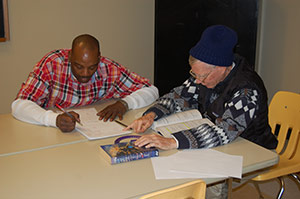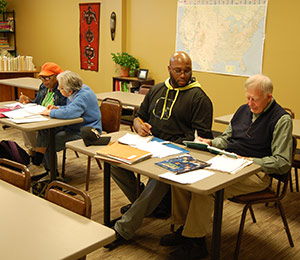On the north side of Milwaukee, just past downtown, is the St. Francis of Assisi Parish and the Adult Learning Center. To those who drive past the buildings, it may seem like nothing special. The stone walls of the parish plant look aged; the paint on the Adult Learning Center is bland.  Student Marvin McDaniel and teacher, Jesuit Fr. Charles Baumann, work in the Adult Learning Center at St. Francis of Assisi Parish, Milwaukee, on Monday, Dec. 1. (Catholic Herald photo by Ricardo Torres)
Student Marvin McDaniel and teacher, Jesuit Fr. Charles Baumann, work in the Adult Learning Center at St. Francis of Assisi Parish, Milwaukee, on Monday, Dec. 1. (Catholic Herald photo by Ricardo Torres)
But a $1.2 million grant from the Housing Authority of the City of Milwaukee, awarded in July, might change that part of the city with a new iCenter attached to the Adult Learning Center.
A partnership between the Housing Authority, the Adult Learning Center, St. Francis of Assisi Parish, Milwaukee Area Technical College, Milwaukee Area Workforce Investment Board, PNC Bank, and Milwaukee Public Schools, the new information technology center will take people step by step from a GED diploma to a career in information technology.
Construction on the center is expected to begin in spring and should be completed by next fall.
“This center will allow people coming in off the street to really drop in and really become more proficient with this new equipment that’s coming out,” Capuchin Fr. Mike Bertram said. “We’re very excited that people will be coming to our property here for the advantage that this technology center can offer.”
The Adult Learning Center is located across the street from the parish on Fourth Street and Reservoir Avenue, and in its 35-year history has helped more than 350 people get their GED diploma or High School Equivalency Diploma (HSED).
The students are 18 years old or older and pay $40 per year tuition. There is a placement test and enrollment is continuous.
“Some of them (students), upon graduating from the Adult Learning Center, will decide, ‘I want to continue my education,’” Fr. Bertram said. “They find that now they’re at a point in their life where they can appreciate learning. They find they’ve got an aptitude for it and they want to continue advancing themselves.” The Adult Learning Center at St. Francis of Assisi Parish, Milwaukee, helps students, age 18 and older, get their GED diploma or High School Equivalency Diploma (HSED). Pictured above in a classroom on Dec. 1 are student Eldora Lathon, left to right, teacher Maryann Greenebaum, student Kurt Bailey and teacher Bill Reinrath. (Catholic Herald photo by Ricardo Torres)
The Adult Learning Center at St. Francis of Assisi Parish, Milwaukee, helps students, age 18 and older, get their GED diploma or High School Equivalency Diploma (HSED). Pictured above in a classroom on Dec. 1 are student Eldora Lathon, left to right, teacher Maryann Greenebaum, student Kurt Bailey and teacher Bill Reinrath. (Catholic Herald photo by Ricardo Torres)
Herb Hayden, executive director of the ALC for the last eight years, predicted the iCenter will fill a void.
“What the iCenter is going to do now is it’s going to open up where we’ll be able to help, not only those who don’t have their high school diploma but also those who do,” Hayden said.
Hayden used an example of a loyal blue-collar employee who has been recently laid off and is struggling to find employment. The iCenter will help develop basic skills with modern technology to fill the voids left by time away from learning.
“I envision that person using those 20 to 30 years that they had of being on time, being dependable, being that go-to person; now we retool them with that technology piece with them being able to understand how to input data, how to read data,” Hayden said. “Then guess what, you’ll be able to take those 20 years at Master Lock … with these new tools that you have and become more marketable.”
Fr. Bertram said he knows some parishioners who want to learn how to navigate technology but might be embarrassed to admit it.
The enrollment at the ALC is 137 students and some students earn their certificate in less than two years, while for others it could be up to three years.
Hayden said, “Life happens,” referring to some of the reasons why some students take longer than others. Some leave the program to take care of a sick family member, some get jobs, or some get incarcerated, he explained.
Members of St. Francis Parish understand what good can come to the surrounding community with the iCenter.
Gene Manzanet, St. Francis parishioner and vice president of community development for PNC Bank, said he was talking with the director of the housing authority, Tony Perez, when Manzanet suggested they invest in the ALC.
We knew that we needed to begin to address, to amplify the way we were addressing some of the economic issues of the constituents of the area,” Manzanet said.
The money will be used to renovate part of the existing space in the ALC to accommodate those who’ll use it. It will also pay for the technology, e.g., computers, routers, etc., that will be used. An elevator will be constructed to make the building fully accessible.
There are also plans to include affordable housing for seniors and free WiFi.
Manzanet said he knew the ALC would be a great place to invest money for this type of project. As a parishioner at St. Francis of Assisi, he’s seen the change in the neighborhood.
“The last 10, 12 years when Fr. Mike (Bertram) has been around, it really has become a center point for that area,” Manzanet said. “You can tell people are more excited to be around the facility and the church.”
Manzanet said he believes the church will help grow the already full ALC.
“The church has to look at itself as a conduit of resources. A conduit of education; a conduit for the community to have a place where they can come get the connectivity that they need to become better citizens,” Manzanet said. “It’s taking its leap to truly be a community leader.”
Perez and the Housing Authority were looking for a partner with “the credibility and commitment to stick around,” he said.
“This facility was going to be one that was not strictly looking inward, in terms of servicing the residents or providing a facility for resident of public housing, but also something that could be used by a broader community,” Perez said, adding they want to serve adults who are “less mobile.”
So they decided to partner with St. Francis and the ALC.
“One of the best kept secrets is the Adult Learning Center,” Perez said. “There’s a gravitational pull to this space.”
The work done by the parish and the ALC helps to give the new iCenter a probability of sustainability over time, he explained.
“If we would’ve done it ourselves I would’ve had to be begging and borrowing every time,” Perez said. “The parish isn’t going anywhere, which is important … it’s an anchor institution.”
Sr. Callista Robinson, a Franciscan Sister of Little Falls, Minn., has worked at the ALC since 2007 and has seen students who have battled homelessness, family stability, the lack of educational support, and learning disabilities, which have held them back.
“Even with a learning disability there are ways to teach children that they can succeed,” Sr. Callista said.
Because the tuition is kept affordable for students, the majority of the money to maintain the program comes via donations and grants.
“We have such a good record of students graduating and being successful that that is what people are looking at,” Sr. Callista said of donors. “They know if they give us a grant to help our students and maintain the learning center they’re doing something worthwhile and they’re not throwing their money away.”
The feelings of optimism and limitless potential touch those involved in the project, although the daunting task of construction and funding loom.
“If we don’t dream, what’s left? Reality can be pretty hard some days,” Perez said of the project and of the students at the ALC. “The place hums.”
